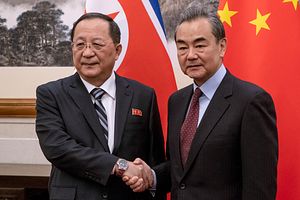North Korea’s foreign minister said his country remains committed to ending its nuclear weapons program in talks Friday with his Chinese counterpart, according to China’s Foreign Ministry.
The talks in Beijing between North Korea’s Ri Yong Ho and China’s Wang Yi came amid a lack of progress in international efforts to persuade North Korea to reverse its drive to build a nuclear arsenal.
China is North Korea’s most important ally, but has agreed to increasingly strict United Nations economic sanctions over its programs to develop nuclear weapons and the ballistic missiles to deliver them. In fact, as of 2017, analysts had pointed to a remarkably chilly relationship between the two neighbors, but that seemingly changed along with North Korea’s diplomatic outreaches to South Korea and the United States. North Korean leader Kim Jong Un met with Chinese President Xi Jinping for the first time in March 2018, over five years after Xi assumed office. Since then, Kim has travelled twice more to China, for a total of three meetings with Xi. Visits and dialogues between high-ranking officials on both sides have also gained pace.
Xi did not attend celebrations of the 70th anniversary of North Korea’s founding in September, seen as a sign that Beijing expected more concrete steps by Kim toward denuclearization.
In the latest high-level exchange, Ri told Wang that North Korea is “committed to realizing denuclearization and safeguarding the peace and stability of the [Korean] peninsula,” Foreign Ministry spokesman Geng Shuang told reporters at a daily briefing.
In the talks, Ri was also expected to have been briefed on discussions last week between Xi and U.S. President Donald Trump, who recently said his next meeting with North Korean leader Kim Jong Un would likely happen in January or February.
Ri later paid a courtesy call on Xi, who told him, “The international and regional situation as well as the situation on the Korean Peninsula remains in flux.”
“So timely exchanges and the coordination of positions between China and North Korea are still extremely essential,” Xi said.
Despite initial optimism generated by Kim and Trump’s June summit meeting in Singapore, diplomacy has since come to a halt amid disputes over a U.S. demand that North Korea first produce a full inventory of its nuclear weapons and take other denuclearization steps before winning significant outside rewards.
China, which fought on North Korea’s behalf in the 1950-53 Korean War, has suggested a more staggered approach, including a suspension of large-scale South Korean and U.S. wargames on the peninsula. More surprisingly, the South Korean government under President Moon Jae-in has adopted a similar approach, pushing for a breakthrough inter-Korea economic relations even while UN and U.S. sanctions on the North remain in place.
In addition to sanctions relief, North Korea wants a declaration on a formal close to the war, which ended with a cease-fire, not a peace treaty, and other reciprocal measures from the United States. North Korea has argued that it has already taken some steps, like dismantling its nuclear testing facility and releasing American detainees, that have yet to be matched by Washington.
Geng said that China-North Korea bilateral relations had “entered a new historic stage,” and the sides would “continue forging ahead with the development of the peninsular situation in the direction of denuclearization.”
Ri’s visit also comes amid intense speculation over the possibility that Kim will visit South Korea this month, in what would be the first such trip by a North Korean leader since the war. Meanwhile, Xi is expected to make his first visit to Pyongyang next year.
Story by Christopher Bodeen for the Associated Press, with additional reporting from The Diplomat.

































